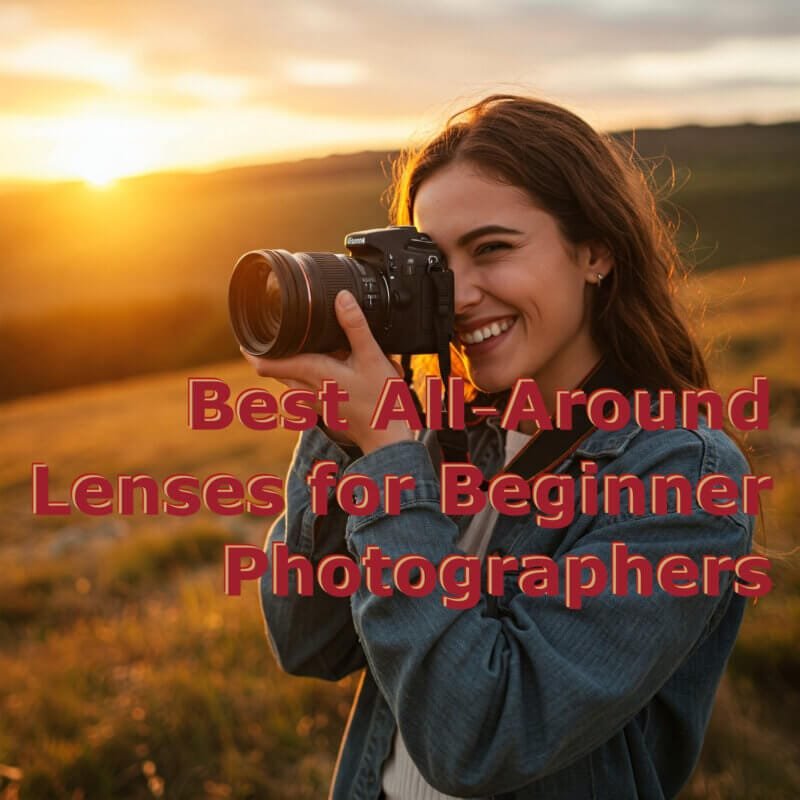Best All-Around Lenses for Beginner Photographers in 2025
Best All-Around Lenses for Beginner Photographers in 2025
Starting your photography journey can feel overwhelming, especially when it comes to choosing the right gear. While camera bodies are important, the lens you use plays a huge role in the quality of your photos. For beginners, the best approach is to invest in versatile, all-around lenses that can handle a variety of shooting situations—portraits, landscapes, street photography, and more. These lenses are easy to use, affordable, and perfect for learning the basics of photography.
In this guide, we’ll explore the best all-around lenses for beginner photographers in 2025, so you can focus on capturing great shots without getting bogged down by technical details.
Why Start with All-Around Lenses?
As a beginner, you don’t need a collection of specialized lenses right away. Instead, opt for versatile lenses that can adapt to different scenarios. These lenses are great for learning because they:
- Save money: Instead of buying multiple lenses, you can start with one or two that cover a wide range of focal lengths.
- Simplify your gear bag: Fewer lenses mean less to carry and less to worry about.
- Help you learn: By using one lens for different types of photography, you’ll quickly understand how focal length, aperture, and composition affect your images.
Top All-Around Lenses for Beginners in 2025
Here are the best lenses for novice photographers that strike the perfect balance between versatility, ease of use, and affordability:
1. Canon RF 24-105mm f/4L IS USM
- Why it’s great for beginners: This lens covers a wide range of focal lengths, making it perfect for everything from portraits to landscapes. Its image stabilization helps reduce blur, and the f/4 aperture performs well in most lighting conditions.
- Best for: Travel, portraits, landscapes, and everyday photography.
2. Nikon Z 24-70mm f/4 S
- Why it’s great for beginners: Compact and lightweight, this lens is ideal for beginners who want a versatile option without breaking the bank. It delivers sharp images and works well in low light.
- Best for: Street photography, portraits, and casual shooting.
3. Sony FE 28-70mm f/3.5-5.6 OSS
- Why it’s great for beginners: This affordable kit lens is a fantastic starting point for Sony users. It’s lightweight, easy to use, and offers optical stabilization for sharper shots.
- Best for: Everyday photography, travel, and learning the basics.
4. Fujifilm XF 18-55mm f/2.8-4 R LM OIS
- Why it’s great for beginners: Known as one of the best kit lenses available, this Fujifilm option offers a fast aperture range and excellent image quality. It’s perfect for beginners who want to experiment with different styles.
- Best for: Portraits, landscapes, and street photography.
5. Sigma 17-50mm f/2.8 EX DC OS HSM (for APS-C cameras)
- Why it’s great for beginners: This third-party lens is a budget-friendly option that doesn’t compromise on quality. Its fast f/2.8 aperture makes it great for low-light situations, and the zoom range is versatile enough for most shooting scenarios.
- Best for: Portraits, events, and indoor photography.
What to Look for in an All-Around Lens as a Beginner
When choosing your first lens, keep these factors in mind:
- Focal Length Range: Look for a zoom lens with a range between 24mm and 105mm. This will give you flexibility for wide-angle shots, portraits, and everything in between.
- Aperture: A lens with a wide aperture (like f/2.8 or f/4) will perform better in low light and allow you to experiment with depth of field.
- Image Stabilization: This feature helps reduce blur caused by shaky hands, especially in low-light conditions.
- Affordability: As a beginner, you don’t need the most expensive lens. Focus on finding a balance between quality and cost.
- Ease of Use: Choose a lens that’s lightweight and easy to handle, so you can focus on learning rather than struggling with your gear.
Tips for Getting the Most Out of Your All-Around Lens
- Experiment with Different Focal Lengths: Try shooting at the widest and longest ends of your zoom range to see how it affects your composition.
- Play with Aperture: Use a wide aperture (like f/2.8) for portraits with blurred backgrounds and a smaller aperture (like f/8) for sharp landscapes.
- Practice in Different Lighting Conditions: Take your lens out during the day, at sunset, and indoors to see how it performs in various settings.
- Learn the Basics of Composition: Use your versatile lens to practice techniques like the rule of thirds, leading lines, and framing.
Final Thoughts
As a beginner photographer, the best lens is one that grows with you. The all-around lenses listed above are perfect for learning the ropes and exploring different types of photography without needing to invest in multiple lenses. Whether you’re capturing portraits, landscapes, or everyday moments, these versatile options will help you develop your skills and discover your unique style.
Remember, photography is about creativity and having fun. Start with one of these beginner-friendly lenses, and let your passion for photography guide you from there. Happy shooting in 2025!

